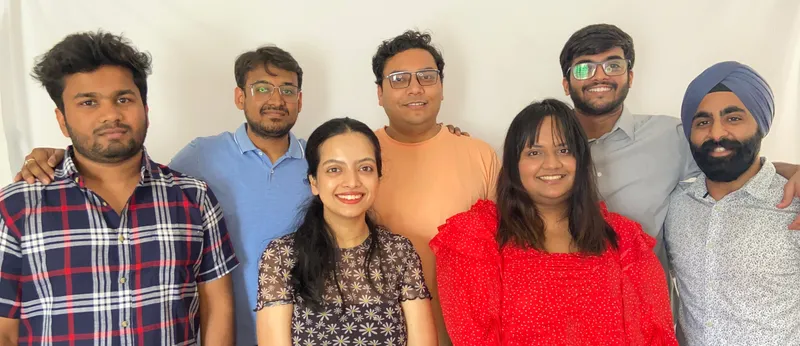How this co-founder of India’s first cross-border neobank found her calling
Highlighting the need to nurture women at the workplace, Udita Pal, Co-founder, Salt, a neobanking venture focused on cross-border payments and compliances, shares her entrepreneurial journey.
Ask her to share some tips for aspiring women entrepreneurs and she promptly quotes Sheryl Sandberg, "Women need to shift from thinking "I'm not ready to do that" to thinking "I want to do that- and I'll learn by doing it."
Meet Udita Pal, Co-founder, Salt, a neobanking venture focused on cross-border transactions and compliances, that aims to transform the way startups and SMEs navigate their way through banking processes.
“Take that shot you want to take. It doesn't matter; your age, marital status, kid's age, or if you took a break from work. If that idea gets you going, go ahead and do it; the worst that can happen is you fail, and it's better to accept failure than to keep wondering “What if…,” adds Udita.
The beginning
Udita’s entrepreneurial journey began when she first experienced the difficulties involved in cross-border payments. “As a consultant, I used to receive money from many countries, and initially, I enjoyed financial freedom, but I realised that it was costing me my mental peace. Whenever money came in from a different country, my bank would freeze my account until I showed proof of invoicing that the transaction wasn't a fraud. For once or twice, you are willing to let go, but after a point, when you have eight clients, transferring over $20,000 and it gets frozen for four months, you end up realising that this isn't right,” she recalls.
After leaving her full-time job in 2019, Udita lived in eight different countries for one year straight, and her biggest nightmare was, 'What if my card stops working?' “The reason behind starting Salt was bad global banking experience. It hit me hard wondering, if consumer banking is so bad, how bad will business banking be! And I got my answer there,” she says.
And thus Salt, a venture she co-founded to offer neobanking service, was born. Explaining the concept of neobanking, Udita says, “People often confuse neobanking with digital banking experience, which many traditional banks currently provide. The difference is that neobanking means a digital-first banking experience. The existence of the physical banking system is removed.”
What it solves for
Salt aims to help SMEs address their banking-related challenges. India processes $1.2 trillion annually, out of which close to 50 percent belongs to small SMEs, informs Udita. Most small to medium exporters are currently poorly served, as they have to deal with a process that is archaic, manual, and cumbersome.
In addition, an exporter must deal with numerous documents, multi-party communication, and delays in their payments or credit along with slow and cumbersome processes at banks, brokers, and NBFCs, who charge exorbitant foreign exchange fees, offer subpar digital banking experience with high turnaround times concerning transaction settlement, and usually involve manual and slow underwriting practices concerning credit to the exporter via invoice financing or working capital financing.
Salt has built an inward remittance product that helps businesses in India to collect from over 50+ countries and six currencies at the cheapest rates in less than 24 hours. The venture has some very clear plans lined up for 2022.
“We are building various products to manage any type and size of the transaction including FDIs to smoothen the process when it comes to global transactions,” shares Udita.

Salt helped over 100 businesses set up social media pages and move their old school experience to digital-first during the pandemic. “We also helped over 25 companies set up shop in the US, helping them understand how documentation works and all of these services were for free. We further created communities on WhatsApp and Telegram around it, dedicated newsletters for small businesses to understand running the business through COVID etc,” she said.
One of their angel investors is a user. “When we launched the product, they were more than happy to beta launch with us and even asked their close friends in the business to use it.
And when we went for Beta, we wrapped up over 100 organic KYCs in a week,” Udita shares proudly.
Sailing through challenges
Though the idea of cross-border payments had always been there since early 2019, it took Udita a year of researching, travelling to over eight countries, and meeting multiple financial institutions to start the process. Within weeks of registering the company, COVID struck.
“Initially, banks were a little hesitant about what we wanted to build. But we still introduced them to what we are building, how we are building, and showed how it would be executed. A few of them came back; we discussed back and forth how we could shape the experience that business owners deserve, and now we are slowly building it,” adds Udita.
Summing up her thoughts on whether the ecosystem is more conducive for women entrepreneurs today, Udita replies,
“We need to broaden our mindset that if women set their minds to something, nothing can stop them. The only way we can nurture women is by building a culture where they feel safe that no opportunity will ever slip away from their hands because of their marital status, pregnancy, or any other reason which has nothing to do with their skills as entrepreneurs. Once we build a safe space, I think there is no stopping.”








